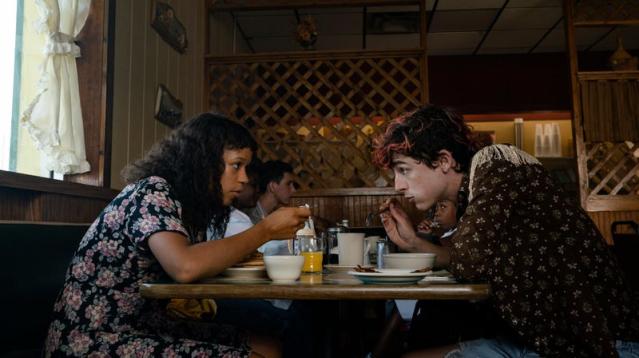This Week We’re Tearing Into:
- a prolific filmography
- a disappointing cable series
- books ‘n tunes
- bayou memories
- human flesh!
Thanks to scb0212, clytie, C.M. Crockford, and Miller for offering bites this week. Send articles throughout the next week to ploughmanplods [at] gmail, post articles from the past week below for discussion and Have a Happy Friday!
Chelsea G. Summers takes to British Vogue to talk about the emerging trend of on-screen cannibalism:
As we slog through our post-pandemic present, a time of quiet quitting and low-key unhinged disaffection, cannibalism speaks our language. Late-stage capitalism, most of us are realising, isn’t delivering on its promise, and endless participation in grind-core hustle culture often feels like we’re being devoured one bite at a time. Beyond that working-class shared experience, however, cannibalism feels ripe for a feminist makeover because so much about femininity centres on consumption – what we can eat, how much we can eat, how to present yourself as appealing, and how those questions are inextricably intertwined.
Sierra Pettengill considers the documentary work of the prolific Heddy Honigmann at Screen Slate:
The roving, man-on-street/portrait-of-a-city school of nonfiction filmmaking is a slippery and precarious art. Oft-practiced but rarely perfected, it can sometimes feel primarily like a documentation of the mechanics of shallow conversation. The humanism required for this form feels almost alchemical. Heddy Honigmann—in these films speaking at various times in French, English, Spanish, and Portuguese—is the rare practitioner whose conversations you feel honored to be listening in on. In these exchanges, sometimes she pushes back, often she laughs along, and it’s clear she usually spends substantial time with her subjects. She also readily allows herself to be ignorant, to not know—and crucially, to be heard not-knowing.
Hilary Plum offers a takedown of We Own This City for The Cleveland Review of Books:
There aren’t characters in We Own This City. There’s exposition. Every line of dialogue is expository. Encounters between characters feel like condescending live-action representations of bland liberal political tropes. If you happen to miss anything, don’t worry, the show will repeat it again. As critics have noted, Jon Bernthal gives a hell of a performance, given not much to work with, and Jamie Hector and others are great, too. When watching The Wire I’ve often gotten depressed at how many fantastic performances we see from actors—especially Black actors—whose careers rarely offered them roles this rich again. […] I didn’t think I’d have to lay this same charge at the feet of the makers of The Wire, 20 years later. Here they’ve rehired a bunch of the great actors they once served so well, but given them garbage to use as dialogue.
And in actual book reviews, the Houston Chronicle‘s Paul Thompson checks in on the two newest books from everyone’s favorite baby-tree tender Cormac McCarthy, finding one to be not as good as the other:
The Passenger, which was released in October, is frustratingly inert, ambling from one sit-down to the next, a string of static, epistemological discussions in bars and restaurants and private-eye offices. New Orleans is perhaps the most interesting city in America to eat and drink in, but these scenes are often shapeless and make sparing use of their surroundings. In Suttree, the McCarthy novel from 1979 that The Passenger sometimes recalls, a half-page stop at a diner wrings more character and dramatic tension from a coffee cup and spoon than can be found in a couple of these interminable lunches.
And also speaking of literature, Anastasia Rose Hyden – better known around these parts as clytie – inventories literary inspirations in hit songs for Mental Floss:
Considered a classic of both gay and Chicano literature, John Rechy’s semiautobiographical 1963 novel City of Night—about a unnamed gay hustler traveling across 1950s America—has been cited as an influence by many artists, including Gus van Sant (who said it helped shape his film My Own Private Idaho) and David Bowie (who wrote a cover blurb for the book’s 50th anniversary edition). The Doors can also be counted among the book’s many fans: The band—whose name was derived from the title of Aldous Huxley’s book The Doors of Perception, which was itself taken from William Blake’s The Marriage of Heaven and Hell—used the title of Rechy’s book in the 1971 hit “L.A. Woman.” The band’s drummer, John Densmore, was also part of a panel at UCLA discussing the book’s legacy for its 50th anniversary in 2013.
And finally, James Lee Burke offers a Louisiana memory of irony and learning in Garden & Gun:
My grandfather was Walter James Burke, one of Franklin Roosevelt’s appointees to the Public Works Administration, and one of the few men in Louisiana who had the courage to testify against Huey Long during Long’s impeachment hearing. He was also one of the most admired attorneys in the history of the state, particularly for his charity and integrity. In January of 1941, when I was a very little boy, my father and I rode the train from Houston to New Iberia to be at my grandfather’s bedside in his last days. The train was crowded with soldiers, the cars musky, the window glass cold. My father stood all the way, even though several soldiers offered him a seat; I sat on his suitcase. The sky was gray, the stubble in the cane fields smoking, the ash black, spinning into the sky. My grandfather died the next morning. His last words were “The final chapter is written. The book is closed. God forgive me for not teaching my children religion.”


